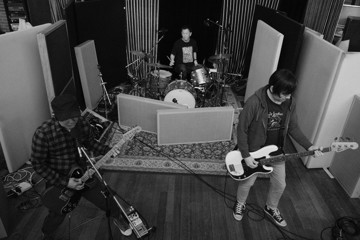'Jack Reacher: Never Go Back' Really Should Have Listened To Its Own Title
Plus: Ron Howard flounders, Chris Pine and Jeff Bridges go west, and Paul Verhoeven turns in a stunner.
JACK REACHER: NEVER GO BACK

If James Bond set the tone for the action-movie as escapist aspirationalism —a winsome window onto a glamorous, globalised parade of exotic locales, comely ladies, and wealth porn— then Jack Reacher reduces the trappings to something far closer to home. Sure, he’s a one-man-killing-machine who eludes death and thwarts bad guys, but outside the fantasy exists a tangible, attainable reality. Rather than a worldly playboy, he’s a drifter —he’s literally homeless— with nothing but the clothes on his back, who hitches from town to town, rides Greyhound buses, sleeps in seedy motels, eats take-away food, drinks diner coffee, and is too scared to kiss the girl. Taking a Jack Reacher tour through anonymous America would cost pocket change, and would be, undoubtedly, a horrifying experience. Riding a Greyhound bus does, indeed, feel cinematic, but the genre is less action-movie, more survival horror.
Jack Reacher: Never Go Back, in turn, has a low-budget feeling to it; its script, especially, feeling plenty cheap. Sure, it cost $60mil to make, but assumedly most of that went to paying the salary of Tom Cruise. Cruise returns to reprise his role —following 2012’s Jack Reacher— of a dad-book hero who populates airport concourses everywhere. On the pulp page, Reacher is 6’6” of sculpted masculinity; the fact that tiny Tom can see himself in such a character a sure sign of his overblown sense of self.
Don't miss a beat with our FREE daily newsletter
In the first film in this series, director Christopher McQuarrie found the humour in the character, serving up every one of its action-movie clichés with a knowing wink. As well as its borderline-parodic tone, Jack Reacher was sharply directed, crisply edited, filled with top-line actors, and boasted a villainous turn from Werner motherfucking Herzog. It was, in short, a smartly made stupid-action-movie.
Sadly, Jack Reacher: Never Go Back —its title an in-built caveat— has none of the humour, verve, or pleasing idiocy of the first film. Instead, its action-movie clichés just come across as dull, predictable, blunt-edged; Cruise’s middle-aged-male fantasies seeming uninspired. He’s still a “40-something” straight-white-male in a mid-life-crisis leather-jacket, but no longer are we invited to laugh at him.
Here, the drifter-with-nothing-to-lose suddenly has something to lose: the teenaged kid he never knew he had! This means that, with every contractually obliged scene of Tom Cruise running, his companions multiply: first it’s just him legging it, then he and Cobie Smulders (as angry-military-dame-cum-love-interest), then he and Smulders and would-be-daughter Danika Yarosh, a rag-tag family on-the-lam from a vast conspiracy of evil military private-contractors out to kill anyone in their way.
The story is utterly, utterly generic; and, sadly, it finds neither impish humour nor knowing charm in that fact. For Never Go Back, Cruise again recruited an old collaborator to fill the Reacher director’s chair. Only, this time, it’s Ed Zwick. Zwick’s career has been long on embarrassing earnestness (and White Saviour films), so it’s no surprise that he’s unable to find any irony or playfulness herein. Instead, he plays up the emotional stakes, believing that the film hinges on Cruise becoming an unlikely father-figure; giving in to a tender, sentimental ending.
Those who enjoyed the absurdity of the last Jack Reacharound joint will be most unmoved, only disappointed. Given a sequel this tired, this inessential, it’s hard to imagine there’ll be a third film that can correct this misstep, even if the end of Never Go Back —Cruise, like the Littlest Hobo before him, hitting the road for his next adventure— is a readymade set-up for the next episode.
INFERNO

If Jack Reacher is your garden-variety middle-aged-male fantasy, the Dan Brown series of Robert Langdon novels —brought to screen, intermittently, by Ron Howard— is an entirely different kind. Those books are, too, staples of airport concourses, and it’s all too fitting, as the American tourist is its intended audience. The old people who wander, fanny-packed, through Europe’s ancient cities and rarefied museums find, therein, fantasies in which tourist sites come to life; in which a wondering American is thrown into conspiracies filled with art-history trivia.
Inferno delivers on that minor promise: if you want to see Tom Hanks and Felicity Jones running through the Boboli Gardens and Palazzo Vecchio and Uffizi Gallery in Florence, Doge’s Palace and Saint Mark’s Basilica in Venice, and the Hagia Sophia in Istanbul, then, well, does Howard have a film for you!
The film he has is, unfortunately —or fortunately, if you’re hoping this series never again bothers screens— fairly tepid; Hanks, in particular, feeling like he’s going through the motions. After his excellent work, of recent, in Tom Tykwer’s A Hologram For The King and Clint Eastwood’s Sully, here Hanks gives off a bland, disinterested turn that positively radiates ‘cashing a cheque’. Ben Foster tries to liven things up by playing a messianic tech-mogul who takes the problem of overpopulation into his own dastardly-plannin’ hands, but one rogue ginge does not a popcorn picture make.
In a device Inferno barely even milks, Hanks is suffering from mild amnesia, unable to explain why he’s at the centre of a conspiracy, how he ended up in Florence, and why he’s plagued by visions of hellfire. This gives the opening a kind of cod-Bourne sting: we’re immediately dropped into confusion, with Hanks and Jones fleeing for their lives.
But Howard —a mediocre craftsman at best— proves unable to capture the kinetic qualities that make for a good thriller. Here, there’s an absence of tension, flaccid pacing, and no sense that the stakes are really meaningful. With the fate of the world in the balance, here we just pause to look at the scenery, impressed that Inferno managed to get permits to shoot at all these places. The film is only out to court those tourists who’ve just been there; flattering those who travel to see the sights, then want to boast that they’ve done so.
HELL OR HIGH WATER

Foster also appears in Hell Or High Water, which is its own action-movie fantasy: a shoot-’em-up sticking it to the banks. It’s, essentially, a magnificently mounted B-movie; a neo-Western that carries itself as if it’s a No Country For Old Men¬-level prestige picture, even as it’s a widely accessible genre-movie. Here, Foster and Chris Pine play a pair of redneck rascals who, in order to save the family farm from foreclosure, commit a string of minor bank robberies. Soon on their trail are Jeff Bridges and Gil Birmingham, cops as dry as the Texan soil on which they tread.
There are plentiful clichés at play —Foster is the loose cannon, Pine the noble criminal; Bridges is a week out from retirement!— but there’s also moments of screenwritten idiosyncrasy, a well-judged ebb-and-flow, and gorgeous sunkissed cinematography. It’s directed by David Mackenzie (last seen helming the Irish prison barney Starred Up), and written by Taylor Sheridan (the actor-turned-screenwriter who penned the script for Denis Villeneuve’s masterful Sicario); and they capture a slice of Americana that sizzles on screen.
Mostly, it’s hot with a sense of genuine socio-political ire, bristling with contempt for the state of America. It’s set on land that, Bridges glibly observes, has been stolen twice over: first by the colonialists, then by the banks. Sheridan’s screenplay is filled with bitter tales of ephemeral gas-booms, corporate land-grabs, foreclosed properties, poverty-stricken farmers, failing crops, abandoned towns. Mid-way through their crime-spree, Foster and Pine’s best-laid plans fall apart when they arrive at a bank branch that’s been closed down. If crimes, and criminals, are a product of the environment that produces them, Hell Or High Water portrays its bank-robbing brothers as natural response to the contemporary climate; making them sympathetic anti-heroes for whom audiences will happily cheer.
ELLE

‘A rape comedy from Paul Verhoeven’ hardly seems like the billing for one of 2016’s most audacious, accomplished works, but, hey, it’s the few surprises of the job that keep your old pal Film Carew showing up for work. Blacklisted from Hollywood after 2000’s rote Hollow Man —a cheesy horror-film in which a rogue scientist develops the power to turn invisible, becomes a sex pest, then tries to kill everyone— the Dutchman has made but one feature in the in-between: the 2006 war-time melodrama Black Book, a revisionist (sex) fantasy of Dutch defiance of Nazi occupation.
The ten years between films is, in part, due to Verhoeven deciding to learn French before making Elle, his first film shot in the language (of love). This was because he had, finally, settled upon Isabelle Huppert as the lead actor in his translation of Philippe Djian’s (French-language) novel Oh… to screen. Verhoeven had initially intended to bring the novel to America, but its provocative text proved resistant to crossing cultures; and harder to find a starlet for. Huppert —the world’s greatest actor— seems, in hindsight, like the only one who could do the central role justice.
Huppert has shone in ‘difficult’ roles before: A Woman’s Revenge, The School Of Flesh, The Piano Teacher, etc. Here, she proves perfectly adept at situating her performance at the story’s weird confluence of tones: Elle at once a psychological thriller, rape-revenge movie, black comedy, social satire, and game of cinematic deception; Huppert’s turn at once raw, wry, rhapsodic, playful, pleasing, horrifying. The film itself may be a surprise, but Huppert’s work is not: here, again, witness the actress at the top of her game.
Huppert plays the head of a video-game studio, who, in a shocking cold open, is raped by a masked intruder in her bourgeois Parisian apartment, while her black cat looks dully on. She’s too proud, too cold, too meticulously ordered to let the attack ruffle her life, so instead keeps on working, hosting dinners, planning parties, sleeping with her married paramour, and flirting with the handsome man across the road. She also works to track down her assailant, and then, amazingly, to draw him into a kind of co-dependent, perverse relationship. There’s also subplots involving deadbeat sons, masturbatory employees, and killing-spree celebrity; Djian’s source text giving Verhoeven a deep, oft-absurd psychological stew to go swimming in.
And swim he does. Armed with an A-list cast —Christian Berkel, Charles Berling, Laurent Lafitte, Anne Consigny, VirginieEfira— the 78-year-old is in fine form; delivering a film loaded with unexpected twists, pointed inversions of gender politics, and moments of true tension; whose every provocation is tinged with comedy, where the audaciousness at work makes it genuinely delightful. Whilst its strange mixture of sex, satire, and genre elements puts it in Verhoeven’s wheelhouse, there’s an elegance, here, unseen in Verhoeven’s career; his meticulous, shadowy frames (beautifully lensed by Stéphane Fontaine, best known for his work with Jacques Audiard) at once sublime and unsettling.







